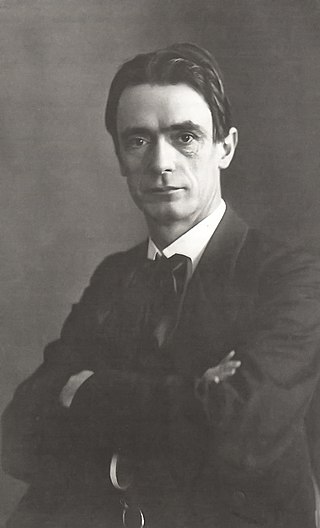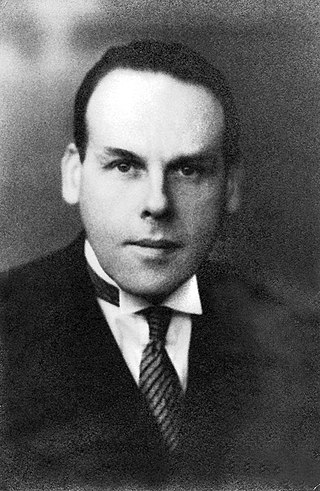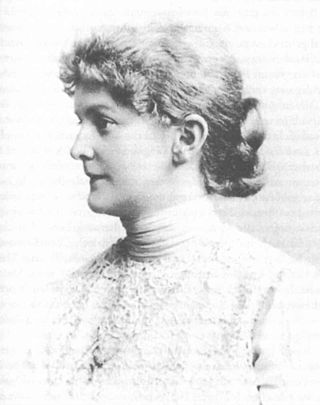Related Research Articles
Anthroposophy is a spiritualist movement which was founded in the early 20th century by the esotericist Rudolf Steiner that postulates the existence of an objective, intellectually comprehensible spiritual world, accessible to human experience. Followers of anthroposophy aim to engage in spiritual discovery through a mode of thought independent of sensory experience. While much of anthroposophy is pseudoscientific, proponents claim to present their ideas in a manner that is verifiable by rational discourse and say that they seek precision and clarity comparable to that obtained by scientists investigating the physical world.

Rudolf Joseph Lorenz Steiner was an Austrian occultist, social reformer, architect, esotericist, and claimed clairvoyant. Steiner gained initial recognition at the end of the nineteenth century as a literary critic and published works including The Philosophy of Freedom. At the beginning of the twentieth century he founded an esoteric spiritual movement, anthroposophy, with roots in German idealist philosophy and theosophy. His teachings have been described as similar to Christian Gnosticism. Many of his ideas are pseudoscientific. He was also prone to pseudohistory.
The General Anthroposophical Society is an "association of people whose will it is to nurture the life of the soul, both in the individual and in human society, on the basis of a true knowledge of the spiritual world." As an organization, it is dedicated to supporting the community of those interested in the inner path of schooling known as anthroposophy, developed by Rudolf Steiner.

Walter Johannes Stein was an Austrian philosopher, Waldorf school teacher, Grail researcher, and one of the pioneers of anthroposophy.
The Camphill Movement is an initiative for social change based on the principles of anthroposophy. Camphill communities are residential communities and schools that provide support for the education, employment, and daily lives of adults and children with developmental disabilities, mental health problems, or other special needs.

Marie Steiner-von Sivers was a Baltic German actress, the second wife of Rudolf Steiner and one of his closest colleagues. She made a great contribution to the development of anthroposophy, particularly in her work on the renewal of the performing arts, and the editing and publishing of Rudolf Steiner's literary estate.
Karl König was an Austrian paediatrician who founded the Camphill Movement, an international movement of therapeutic intentional communities for those with special needs or disabilities.
Sergei Olegovich Prokofieff was a Russian anthroposophist. He was the grandson of the composer Sergei Prokofiev and his first wife Lina Prokofiev, and the son of Oleg Prokofiev and his first wife Sofia Korovina. Born in Moscow, he studied fine arts and painting at the Moscow School of Art. He encountered anthroposophy in his youth, and soon made the decision to devote his life to it.
Eugen Kolisko was an Austrian-German physician and educator who was born in Vienna. He studied medicine at the University of Vienna, and in 1917 became a lecturer of medical chemistry. He was the son of pathologist Alexander Kolisko (1857-1918).
Ernst Lehrs was a German anthroposophist, Waldorf teacher, lecturer and writer.
Rudolf Hauschka was an Austrian chemist, author, inventor, entrepreneur and anthroposophist.
Francis Edmunds was an educator and Anthroposophist and the founder of Emerson College, Forest Row.
Thomas Weihs was an Austrian doctor, farmer and special needs educator, one of the founders and leading co-workers of the Camphill Movement and a pioneer of Anthroposophical curative education.
Michael Wilson, was a musician, curative educator, scientist, translator and General Secretary of the Anthroposophical Society in Great Britain

Wynstones School was a Steiner Waldorf school in Gloucestershire, set on 11 acres near Gloucester. It took pupils from pre-school through to university entrance and has an enrolment of around 275 students.
Violetta Elsa Plincke was a Waldorf teacher and lecturer on education who contributed much to the establishment of Steiner education in Britain.
Dr Hans Schauder, was a British medical adviser and counsellor, co-founder of Camphill Community, founder of Garvald School & Training Centre
The Garvald Centres are a group of six affiliated but independent Scottish charities that support people with special needs and learning disabilities. It is based on the work of the Austrian esotericist Rudolf Steiner. The charities operate in the Midlothian, Scottish Borders and Edinburgh area of Scotland.

Carlo Pietzner (1915-986) was a co-founder of Camphill, artist, anthroposophist, and a Special Needs and adult educator.
Johannes Tautz (30 September 1914 in Koblenz am Rhein to 13 March 2008 in Dortmund, was a historian, religious scholar, Anthroposophist, author and Waldorf teacher. He concerned himself with a better understanding of National Socialism and with questions of education in the twentieth century.
References
- ↑ ‘’The Builders of Camphill: Lives and Destinies of the Founders’’ Edited by Friedwart Bock, Article by Christine Polyblank, Floris Books, 2004 ISBN 0863154425, 9780863154423
- ↑ Rudi Lissau – Article by Marjatta van Boeschoten, Biographien Dokumentation der Forschungsstelle Kulturimpuls retrieved 2014.09.12